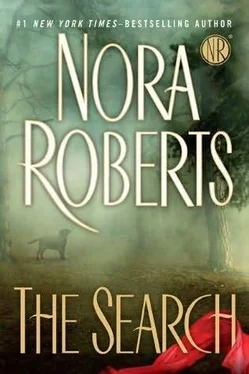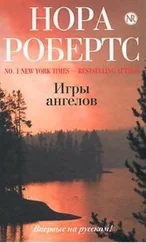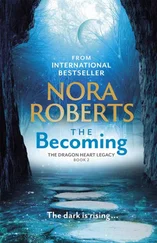Instead, she stood where she was for several minutes, just staring out at the road. Then she walked back to the porch steps, sat. And sat.
So he’d make the excuses, Simon decided. Easy enough. Just remembered something I have to do. Dog’s coming along, blah, blah, see you.
He crossed toward her, pleased it only took a couple of tugs to have the pup fall in line. And as he approached, he saw she was dead white, and the hands clutched on her knees trembled lightly.
Crap.
With walking casually away no longer an option, he scooped up the puppy before Jaws could try to leap into her lap.
“Bad news,” he said.
“What?”
“The deputy brought bad news. Is Sylvia all right?”
“Yes. It’s not about Sylvia.”
Her dogs, sensing her mood, clustered around her. The big yellow Lab rested his head on her knee.
“Ah... we should...”
He watched her struggle to pull herself out of whatever hole she’d fallen into.
“We should work on sit and stay.”
“Not today.”
She looked up at him then, but he couldn’t translate what clouded her eyes. Grief ? Fear? Shock?
“No,” she agreed, “not today. Sorry.”
“No problem. I’ll see you next time.”
“Simon.” She drew a breath as he hesitated. “Would you mind... Could you stay for a while?”
He wanted to say no—wished he had it in him to say no. Maybe he’d have found it in him if it hadn’t been so obvious it was as hard for her to ask as for him to agree.
“All right.”
“Why don’t you let him run awhile. The big guys’ll watch him. Play,” she said as Simon unclipped the leash. “Stay close. Close,” she repeated, stroking fur. “Watch Jaws, go play.”
They whined a little, and each glanced back at her as they started into the yard.
“They know I’m upset. They’d rather stay until I’m not. You’d rather go.”
He sat beside her. “Yeah. I’m not much good at this kind of thing.”
“Not much good’s better than no good.”
“Okay. I guess you want to tell me the bad news.”
“I guess I do. It’ll get around the island anyway.”
Still, for a few moments she said nothing at all, then seemed to gather herself.
“Several years ago there was a series of abduction murders. Young women, ranging from eighteen to twenty-three. They were all college students, twelve of them over a three-year period. California, Nevada, Oregon, New Mexico, Washington state were either abduction sites or burial sites—or both.”
It rang a bell somewhere, dimly, but he said nothing.
“They were all the same type—not physically, as he crossed races and coloring, but basic body types and all college students, athletic, outdoorsy, outgoing. He’d stalk them for weeks once he’d chosen a target. Sometimes longer. Meticulous, patient, he’d record their routines, habits, wardrobe, friends, family, schedules. He used a tape recorder and kept a notebook. All of them either jogged or hiked or biked routinely. Habitually.”
She drew another breath and made him think of someone preparing to execute a surface dive in murky water.
“He preferred women who went out alone, early morning or dusk. He approached from the opposite direction—just another jogger, another hiker. And when he closed in, he used a stun gun to take them down. While they were incapacitated, he carried them to his car. He had the trunk lined with plastic so there’d be no trace on the bodies, and no trace of them in the trunk.”
“Thorough,” Simon said, thinking out loud.
“Yes. Very.” She continued briskly, without inflection, like a woman giving a report she knew by rote. “He bound them with nylon cord, gagged them with duct tape, then gave them a mild sedative to keep them under, keep them quiet. He’d drive to a national park. He’d already have the spot picked out. While the search went on for her, in the area she’d been abducted, he was hours away, forcing this groggy, terrified woman to walk, through the dark, off the trail.”
Now her voice hitched, a quick tremble as she linked her fingers together in her lap and stared straight ahead. “He dug the grave first—not too deep. He wanted them to be found. He liked them to watch him dig so he tied them to a tree. They couldn’t beg, couldn’t even ask him why because he kept them gagged the entire time. He didn’t rape them or torture them, physically. Or beat them or mutilate them. He just took out the red scarf and, while they were bound and gagged, unable to defend themselves, strangled them. He tied it in a bow when he was finished, and buried them.”
“The Red Scarf Killer. That’s what the press called him,” Simon commented. “I remember this. They caught him after he shot some cop.”
“Greg Norwood. The cop was Greg Norwood, and his dog, his K-9 partner, Kong.”
The words throbbed in the air between them like an open wound.
“You knew him.”
“Perry laid in wait for them. Greg had a place, a nice little weekend place near Lake Sammamish. He liked to take Kong there, work on his training. Once a month, just the two of them. Boy-bonding, he called it.”
She laid her hands on her knees, a casual gesture, but he saw the way her fingers dug in.
“He shot Greg first, and maybe that was his mistake. He put two bullets in Kong, but Kong kept coming. That’s what they reconstructed, and that’s what Perry said happened, trading confessions, information, details against the threat of the death penalty when he knew he’d lose the trial. Kong tore Perry up pretty good before he died. Perry was strong, and he managed to get back to his car, even drove a few miles before he passed out, wrecked. Anyway, they got him. Greg, he was strong, too. He lived two days. That was in September. September twelfth. We were going to be married the following June.”
Useless words, Simon thought, but they had to be said. “I’m sorry.”
“Yeah, me too. He staked Greg out for months, maybe longer. Meticulous, patient. He killed him to pay me back. See, I was supposed to be his number thirteen, but I got away.”
She closed her eyes briefly. “I want a drink. Do you want a drink?”
“Yeah. Sure.”
When she rose and went in, he debated going with her, and decided maybe she needed a little time to pull it together.
He remembered bits and pieces of the story. Remembered now there’d been a girl who escaped, and who gave the FBI a description of the man who abducted her.
Years ago, he thought now, and tried to think what he’d been doing when the story had been hot.
He just hadn’t paid that much attention, he thought now. He’d been, what, about twenty-five? He’d just moved to Seattle and had been trying to build a reputation, make a living. And his father had that cancer scare about that time. That had eclipsed everything else.
She came out with a couple glasses of white wine.
“It’s an Aussie chardonnay. All I’ve got, apparently.”
“It’s fine.” He took the glass, and they sat in silence, watching the heap of dogs who’d decided to take a nap. “Do you want to tell me how you got away?”
“Luck, on the heels of stupidity. I shouldn’t have been out alone that morning on that jogging path. I should’ve known better. My uncle’s a cop, and I was already seeing Greg, and they’d both made a point of telling me not to run without a partner. But I couldn’t get one who’d keep up with me. Track star,” she added with a ghost of a smile.
“You’ve got the legs for it.”
“Yeah. Lucky me. I didn’t listen to them. Perry hadn’t crossed over to Washington at that point, and there hadn’t been an abduction for months. You never think it’s going to be you. You especially never think that when you’re twenty. I went out for my run. I liked to go early, then hit the coffee shop. It was a crappy day, gloomy, rainy, but I loved running in the rain. This was early November, the year before Greg died. I had a second, just a second when I saw him. So ordinary-looking, so pleasant, but I had that click. I had a panic button on my key chain. I even reached for it, but it was too late. I felt that shock of pain, then nothing works.”
Читать дальше












